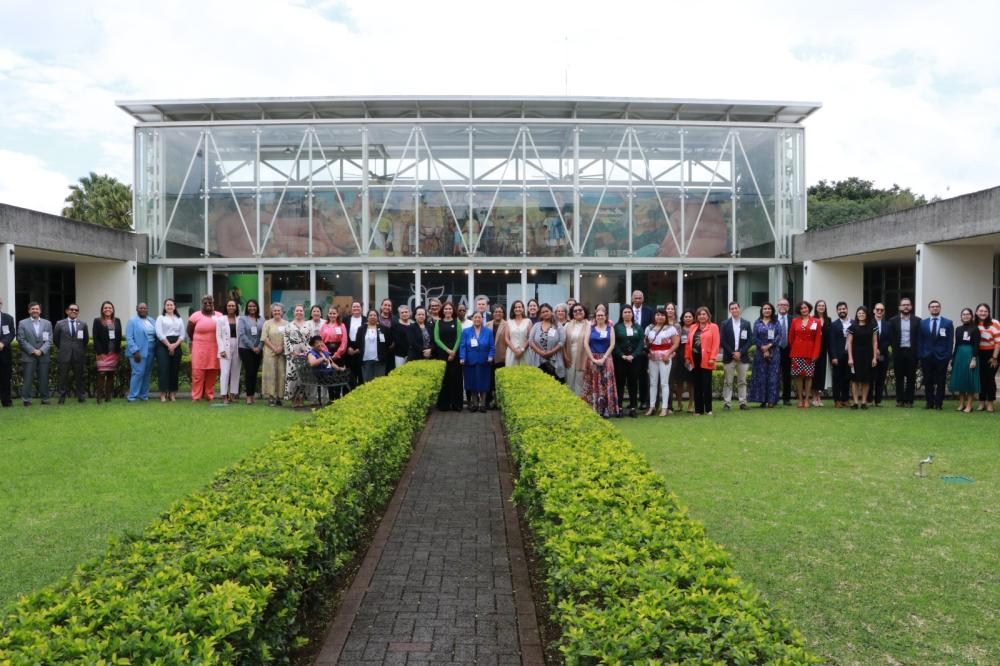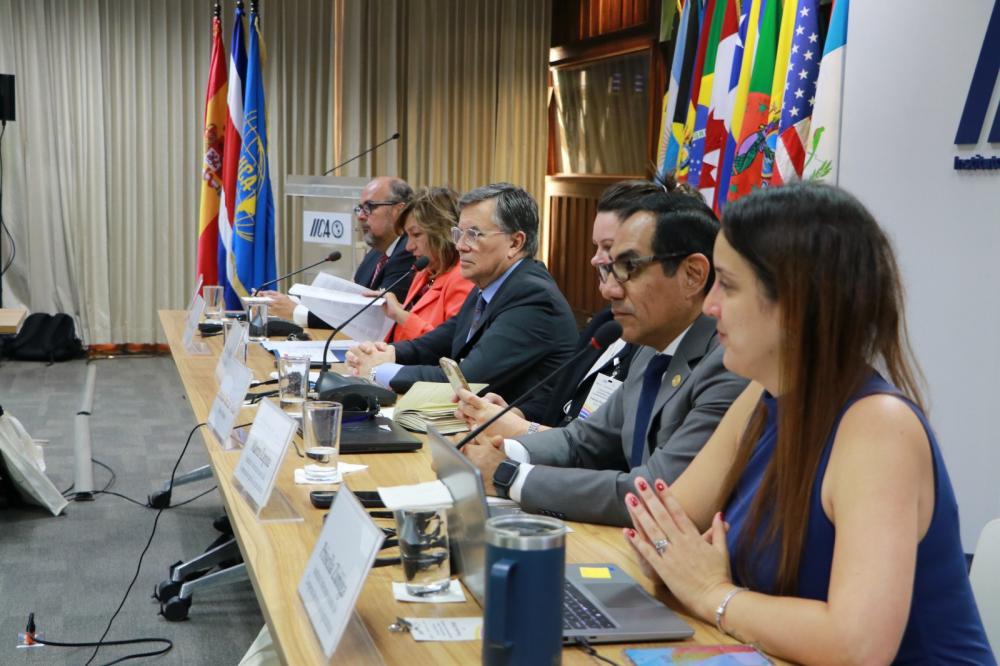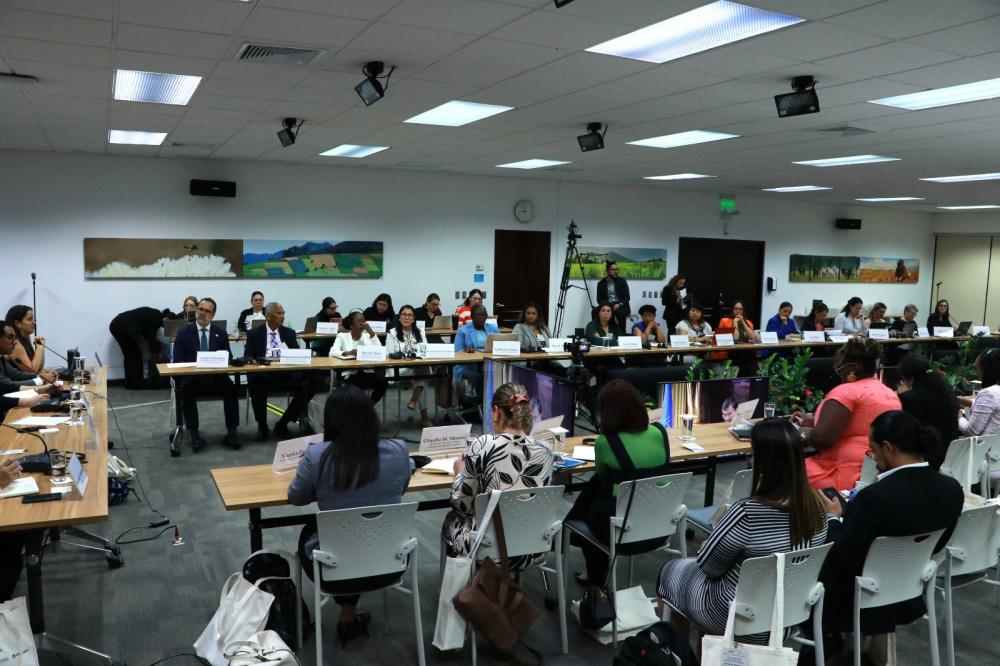Forum of Female Ministers, Deputy Ministers, and Senior Officials organized by IICA highlights the importance of measuring care work to bring visibility to the contributions of rural women in agri-food systems

San José, 22 October 2024 (IICA) – Producing statistics and data on unpaid care work is key to highlighting the crucial role that rural women play in the agri-food systems of the region, stated the Female Ministers, Deputy Ministers, and Senior Officials from the Americas gathered at the headquarters of the Inter-American Institute for Cooperation on Agriculture (IICA) in Costa Rica.
The 5th Edition of the Permanent Forum of Female Ministers, Deputy Ministers, and Senior Officials of the Americas (FOPEMA), organized by IICA, reached consensus on this and other matters during a meeting attended by more than 75 high-level leaders, including ministers and deputy ministers from Agriculture and Women’s Affairs ministries.
The participants agreed on the urgent need for data to accurately analyze the gender disparities affecting rural women, who, in addition to being pillars in food production, take on most of the care work.
The forum included a call to the countries in the region to promote public policies that recognize and value care work carried out primarily by rural women, aiming to reduce inequalities, promote gender equality in agri-food systems, and ensure that women have greater access to formal employment opportunities and decision-making spaces.
Among the authorities present were Laura Suazo, Secretary of Agriculture and Livestock of Honduras; Cindy Quesada, Minister of Women of Costa Rica; Alejandra Mora, Executive Secretary of the Inter-American Commission of Women (CIM); Cindy Rodríguez Mendoza, Deputy Minister of Foreign Affairs of Honduras; Citlalli Hernández Mora, Secretary of Women of Mexico; Niurka del Carmen Palacio, Minister of Women of Panama; Viviana Mesquita, Deputy Secretary for Rural Women of the Ministry of Agrarian Development and Family Agriculture of Brazil; Xochitl Torres Small, Deputy Secretary of the U.S. Department of Agriculture (USDA); Nancy Andrea Moreno Lozano, Secretary General of the Ministry of Agriculture and Rural Development of Colombia; Justine Hendricks, CEO of Farm Credit Canada; and Manuel Otero, Director General of IICA.
Secretary Laura Suazo addressed the issue of quantifying the participation of rural women in the agri-food systems of the Americas and the importance of care systems with a territorial approach. “It is essential to have accurate figures to design effective policies that promote gender equality and sustainable development in our rural communities,” she stated.
During her speech, Minister Quesada highlighted the need to place rural women at the center of the public policy agenda. “We cannot continue making public policy from behind a desk. It is crucial to understand the realities and needs of rural women in order to design effective and relevant policies,” she said.
Deputy Minister of Foreign Affairs Rodríguez Mendoza called for joint action between governments, civil society, and the private sector to implement public policies that recognize and strengthen the role of rural women in agri-food systems, a task being reinforced in Honduras. “Only through collaboration and commitment can we achieve significant and lasting change. Let us not forget the importance of quantifying care work in rural settings and its impact on equality policies,” she said.

Otero, for his part, highlighted the central role of rural women in agri-food systems and referred to the disparities they face, such as limited access to agricultural resources and inputs, and the burden of care work, which result in a 24% productivity gap compared to men.
He mentioned that despite their importance, women earn, on average, 20% less than men in agricultural work, which negatively affects not only their lives but also the global economy.
Justine Hendricks, CEO of Farm Credit Canada, emphasized the importance of analyzing the barriers women face in accessing financing and the lack of data on their role in the success of the agricultural industry. “If these barriers are addressed, women can unlock growth and long-term success for both their families and the industry as a whole,” she said.
She also spoke about Farm Credit Canada’s support for the mental health of rural women, who are essential to the functioning of agricultural operations. “This additional burden comes with isolation, lack of social networks, and insufficient recognition of their work,” she noted.
Alejandra Mora stressed the need to promote leadership and the participation of women at all levels, especially in rural areas. “Leadership does not happen overnight, and it is crucial to change the narrative to incorporate women's skills and abilities into decision-making spaces,” she stated.
Torres Small emphasized that women are essential components of the global agri-food system and are not always recognized as such. “In the United States, we have made significant investments in technical assistance, training, and regional and local food systems, providing much-needed resources to support more women in agriculture,” she explained.
She also highlighted USDA’s efforts to ensure more equitable access to its programs, especially related to financing, which is critical for land access. “Events like this forum offer the perfect place to exchange ideas and continue the efforts already underway in our respective countries to ensure that women farmers have the opportunities they need to grow and thrive,” the U.S. official stated.
For her part, Nancy Andrea Moreno Lozano, from Colombia, underscored that rural women are the primary caregivers but receive no compensation for this essential work. “We have strengthened the concept of rural care from a practical perspective, incorporating productive projects that drive agri-food sustainability and the care economy, specifically rural care,” she said.
She explained that the care economy should not be limited to the household, as women improve their quality of life, their environment, their communities, and their territory. “Community care means that women positively affect the lives of their neighbors and everyone around them, transforming their ecosystem when their quality of life improves,” she stated.
Launches and Strategic Collaborations
As part of the forum, several initiatives were launched to improve economic opportunities for rural women, including the "Empowerment and Soft Skills Course for Rural Women," developed in collaboration with the Inter-American Commission of Women (CIM), and the "Introduction to Basic Finance Course for Rural Women," created in partnership with the BBVA Microfinance Foundation (FMBBVA).
Additionally, the English version of this training was introduced, entitled “Introduction to Entrepreneurship Course for Rural Women”, an initiative led by IICA.
These training tools represent a crucial step in improving the living conditions and economic opportunities of rural women, who often face significant barriers in accessing financial resources and soft skills training.
Results of the Forum and Publication on the Care Economy
During the forum discussions, it was highlighted that unpaid care work accounts for up to 21.3% of the global Gross Domestic Product (GDP), with women contributing 75.5% of this total.
This reality, based on data from the Economic Commission for Latin America and the Caribbean (ECLAC), underscores the need to incorporate measurements of the care economy into public policies to adequately value this invisible work.

Additionally, the publication “The Care Economy in Rural Territories of the Americas” was presented, a report that thoroughly analyzes how the feminization of care work affects rural women in Latin America and the Caribbean.
The study offers concrete recommendations to reduce gender gaps and improve the coverage of care services in rural areas, where availability is considerably lower than in urban areas.
Priscila Zúñiga, Manager of the Gender Equality and Youth Program at IICA, reflected on the importance of the forum as a space for open and collaborative dialogue, where participants can contribute to gender equality in agri-food systems. “This forum allows us to break protocol and look each other in the eye to discuss and advance crucial issues for rural women,” she said.
More information:
Institutional Communication Division.
comunicacion.institucional@iica.int